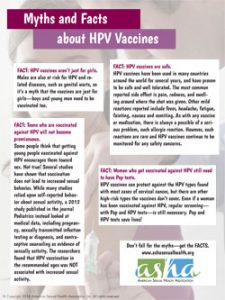Each August, National Immunization Awareness Month provides an opportunity to highlight the value of immunization across the lifespan. At ASHA, we focus on three important vaccines that can help prevent sexually transmitted infections—vaccines for human papillomavirus (HPV), Hepatitis B and Hepatitis A.
HPV

HPV is very common. Most sexually active people have HPV at some point in their lives. The infection is usually harmless and the body most often clears it in a short time. But sometimes, HPV does not go away. In a few people, high-risk HPV and related cervical cell changes last for many years and can lead to cancer if they aren’t found. Being vaccinated against HPV can lower the chance a woman will develop cervical cancer.
HPV can also lead to other types of cancer, including cancers of the penis, anus, or oropharynx (back of the throat, including base of the tongue and tonsils). Low-risk types of HPV can cause genital warts.The types of HPV that can cause genital warts are not the same as the types that can cause cancer. HPV vaccines can help prevent these diseases too.
There are currently three HPV vaccines available:
- Gardasil® is vaccine available for both males and females. Developed by Merck, Gardasil® is close to 100% effective at preventing infection associated with HPV types 6 and 11(types associated with 90% of all genital warts) and types 16 and 18 (types associated with 70% of all cervical cancers, and many anal, vulvar and vaginal cancers).
- Cervarix®, developed by GlaxoSmithKline (GSK) is a vaccine just for women. This vaccine is also close to 100% effective at preventing infection associated with HPV 16 and 18 (associated with 70% of all cervical cancers). Studies suggest Cervarix® also offers cross-protection against other “high risk” HPV types.
- Gardasil 9® was approved in December 2014. The new vaccine covers nine HPV types: the two low-risk types that cause most cases of genital warts (HPV 6 and HPV 11) along with seven high-risk types (HPV 16, 18, 31, 33, 45, 52, and 58) found in a number of cancers, including about 90% of cervical cancers around the world as well as most anal, vulvar, and vaginal cancers.
Experts recommend that all females between the ages of 9 and 26 get an HPV vaccine. About half of all new infections are diagnosed in girls and young women between 15 and 24 years of age, so early vaccination is important. Males are at risk for HPV and related diseases, too, so boys and young men are also recommended to be vaccinated.
Hepatitis B
Hepatitis B virus is transmitted through direct contact with blood, semen, or vaginal secretions.
Hepatitis B can be transmitted through unprotected vaginal, anal, or oral sex. In adolescents and adults, this is the most common mode of transmission. It can also be transmitted by injecting drug users who share needles or other injecting equipment contaminated with HBV-infected blood.
Hepatitis B can cause chronic infection, cirrhosis (scarring) of the liver, liver cancer, and even death. The good news is that hepatitis B is preventable through vaccination. The Centers for Disease Control and Prevention (CDC) recommends hepatitis B vaccination for:
- Sex partners of anyone who has hepatitis B
- Anyone who is sexually active but not in a long-term, monogamous relationship
- Those treated for STD/STIs
- Men who have sex with men
- Others recommended for hepatitis B vaccine include:
- All infants and children under age 19 who have not had the vaccine
- Injecting drug users who share needles
- Those living in households with someone who has hepatitis B
- Anyone whose work places them in contact with blood
- Those with HIV or chronic liver disease
- Individuals in correctional facilities
- Travelers to areas with a high prevalence of hepatitis B
Hepatitis A
Hepatitis A virus is transmitted primarily through oral contact with feces (oral-fecal contact). This includes contaminated food or water sources but also sexual contact, especially oral-anal sex. Like hepatitis B, hepatitis A can also be prevented through vaccination. The Centers for Disease Control and Prevention (CDC) recommends hepatitis A vaccination for:
- All children
- Men who have sex with men
- Illegal drug users